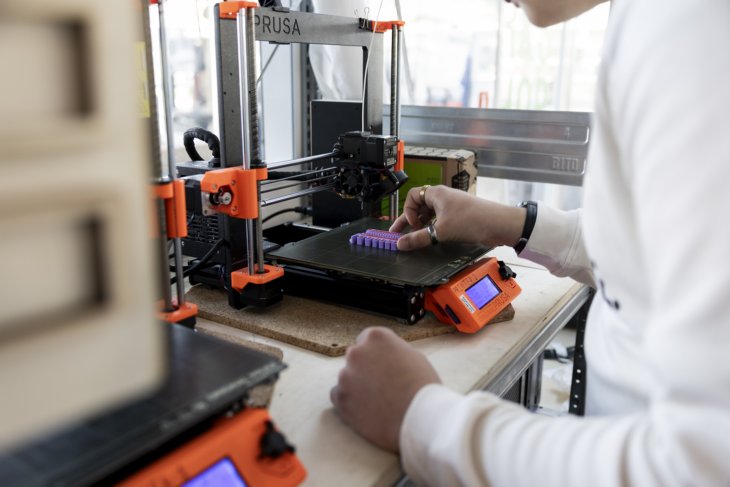Without further ado, here are some ideas for hobbies that might – just might – interest you, depending on your study.
Engineering & Technology
3D printing (Mechanical Engineering)
As a mechanical engineering student, I’ve found that our study offers a broad range of hobbies to choose from, and 3D printing ticked a bunch of boxes for me: it’s relatively cheap to get into nowadays, it’s fun, it’s educational, and its possibilities are nearly endless. You could print aesthetic stuff, like decorations (I have a bunch of 3D-printed cats), or functional stuff like hooks and clamps. However, there might come a time where you need something so specific that you can’t find it on any 3D model database, so you’re left with no choice but to design it yourself. That’s where the true fun lies – by learning how to model things and how to design them properly, you open up a new world for yourself. There’s nothing quite like using something you designed and printed yourself, and seeing it actually work.
PC building and restoration (Any engineering study)
If you’re into tech, then you could also look into ways of building and restoring tech. This can be anything from opening up your broken laptop and learning obscure soldering techniques (not recommended, tried and failed horribly) to staying up-to-date with the happenings of the computer parts worldwide. Plus, it might be a good idea to get familiar with the things you interact with on an almost daily basis, so learning about what’s inside your computer (and, more importantly, learning how to properly troubleshoot) could change your life.
Coding (Computer Science, Electrical Engineering)
There’s nothing super specific about this hobby, just that you need to sit down in front of your coding environment and code. If you’re interested in making games, you could start easy, with something like Snake, and progress onto platformers as you get better. If you like data science, then maybe you could pull data from your favourite website or service (say, Steam, Netflix, or the like) and build a giant repository of data for your or others’ viewing pleasure – that’s sure to keep you busy for a few months, and the information you potentially get could be extremely valuable to some people. You could also fire up LeetCode and grind out your problem-solving skills.
Architecture photography (Architecture, Civil Engineering)
Who doesn’t like to look at pretty buildings? Whenever I’m in a new place, I always like to snap a couple of photos of old, gothic architecture, since that’s something I like drawing and reading about.
Natural and Physical Sciences
Astrophotography (Physics, Astronomy)
As someone who loves looking at the latest pictures from the James Webb Space Telescope and wishes they could replicate them with a lousy camera… much respect to people who’ve picked up astrophotography. It’s one of those hobbies that can get extremely expensive, not to mention time-intensive: you could spend days or weeks trying to get the perfect shot of the celestial heavens. Astrophotography is one of the most technical forms of photography you could get into, as you need special equipment and techniques and a deep understanding of those things to get your special photos. I think I’ll just stick to snapping a quick photo of the night sky with my phone whenever I see a nice constellation.
Perfume-making (Chemical Science & engineering)
How cosy would that be? You go home after a hard day’s work, tired and smelling a bit funny, only to indulge yourself in nice-smelling chemicals and fragrances. At its core, perfumes are made by mixing things that smell good with things that can carry that smell: you can do this by mixing essential oils with aromachemicals or alcohol. Not a super expensive hobby – though, like most other hobbies, things can take a turn for the worse for your wallet if you’re deep enough.
Gardening and animal-watching (Biology)
While these two hobbies are quite distinct from each other, I consider them in-line with each other if you enjoy nature. I am by no means a garden person (mostly because I don’t have a garden), though I do enjoy my nature treks and getting excited whenever I see an uncommon animal I’ve read about. Plus, with gardening, I imagine this is very much a hobby that is very satisfying – you plant a seed, you take care of it, you do your research to make sure you don’t accidentally kill it, and you get to watch it grow and blossom. If you do it right, at least 😉
Fitness and nutrition planning (Medicine, Health Sciences)
If you enjoy going to the gym or exercising, then you’re not truly reaping the benefits unless you’re eating foods that complement your training regime. You could use the knowledge you gain from your studies to create a tailored meal and nutrition plan – you probably won’t follow it to the dot, but it could be fun to help your friends make their own plans as well.
Social Sciences
Book clubs (Any study)
I wasn’t quite sure what else to name this, since it’s not strictly a ‘book’ club. I’m mainly talking about something similar to my philosophy class I go to, which isn’t just for philosophy students – as long as you’re interested in philosophy, and you like expressing your opinions and debating, then a ‘book club’ could be interesting. Regardless, having weekly meetings with a group of people where you collectively agree to talk about something you’ve read is a surprisingly fun concept, and I wasn’t sure I would enjoy it before I joined, but I’ve grown to absolutely love talking and hearing out the opinions of my fellow peers.
Journalling (Psychology, Communication Science, any study)
Knowing how you think and understanding what your thoughts mean is important to familiarise yourself with… well, yourself. I don’t journal religiously, since I forget that journalling is even a thing most days, but if I do remember it’s always been a pleasant, relaxing experience. A friend who studies psychology tells me this about journalling: it helps them remember their day, helps them think things out rationally, and helps them to remember to be grateful. Sounds like something everyone should do, right?
Coin collecting (History, Archaeology)
officially termed “numismatics”, this hobby allows you to delve into the niche world of collecting coins from around the world. You could also step it up and try to find ancient coins on top of your regular quest – who knows what you might find in an old thrift shop?
Business and Economics
Graphic design (Marketing, Communication Science)
Graphic design plays a key role in shaping how we interact with products. Ever looked at a logo, a poster, or an ad, and thought, Huh, that looks cool? Graphic design can be easy to pick up, but hard to master – you can start with tools such as Canva, Illustrator, or Photoshop, and spend hours trying to find a design that represents a product. A good skill to have, and an important one if you’re studying something in the business-side of things.
Photo/videography (Business Administration, Communication Science)
Whether it’s filming short documentaries, shooting aesthetic portraits, or just experimenting with cool editing techniques, photo- and videography are both creative and technical. Also, who doesn’t like having someone around who can edit?
Online selling (Any study)
I remember my sister, when she was in middle school, would sell her old clothes and things she didn’t need on online marketplaces, as a hobby. She’d make quite a bit of money, too, so maybe this will be your incentive to start looking at the things you don’t need and selling them. Plus, it’s good to get some data on what people are willing to buy, and what they’re looking for when shopping.
I hope you enjoyed the list! There are, of course, an endless number of hobbies that could have been mentioned – if you’re studying business, maybe something to do with simulating the stock market could be an idea, for example. However, every list must end at some point, and hopefully you’ve gotten some new ideas to think about when you’re feeling bored and want to indulge yourself in a new hobby instead of a video game or a show. Remember that every new thing will be hard to get into – as you put time and effort, the rewards start to show, so keep at it!




